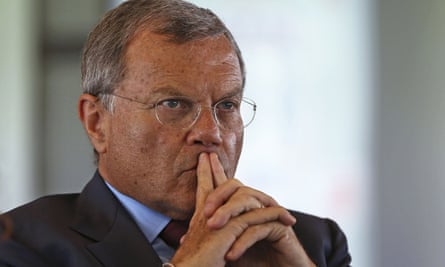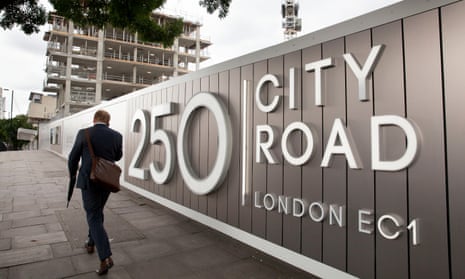The bosses of Britain’s largest public companies earned an average of £5.5m last year, and have enjoyed a 10% pay rise while wages in the rest of the economy lag far behind.
Rapid inflation for the country’s best paid executives is being driven by a small, all-male group at the top of the corporate tree, according to the High Pay Centre, which published its annual survey on earnings at FTSE 100 companies on Monday.
“There is apparently no end yet in sight for the rise and rise of chief executive pay packages,” said the centre’s director, Stefan Stern. “In spite of the occasional flurry from more active shareholders, boards continue to award ever larger amounts of pay to their most senior executives.”
Leading company bosses now typically earn 129 times more – including pensions and bonuses – than their employees.
The prime minister has promised to rein in soaraway salaries. In a shot across the City’s bows, Theresa May last month set out a series of boardroom reforms, including giving employee representatives a seat at the top table. She condemned the “irrational, unhealthy and growing gap between what these companies pay their workers and what they pay their bosses”.
For the average worker, wages rose by 2% in 2015, according to the Office for National Statistics. The modest increase followed sharp falls in the wake of the financial crisis.
In the meantime, top bosses’ pay has soared from £4.1m in 2010 to just under £5m in 2014, to £5.48m last year.

The advertising boss Sir Martin Sorrell topped the high earners league for the second year running, receiving a record £70m in 2015, one of the biggest annual windfalls in UK corporate history.
The executive who built WPP from a manufacturer of wire baskets into the world’s largest advertising group saw his pay jump from an already controversial £43m in 2014.
Tony Pidgley, the founder and chairman of house builder Berkeley Group, came second with £23m. His pay rocketed thanks to share options granted in 2009, when the financial crisis had triggered a collapse in Berkeley’s stock market value.
Sorrell is one of six bosses who have appeared in the top 10 two years running. The others include Rakesh Kapoor at pharmaceuticals group Reckitt Benckiser, who took home £23m; Bob Dudley, who collected £13m for running the oil group BP; and the banker António Horta Osório, who was paid £8.8m at Lloyds Group, which is partly owned by the taxpayer.
“Big pay is a boys’ club,” the report claims. No women made it into the ranks of the 10 highest earning executives in either of the last two years.
The Sky television boss, Jeremy Darroch, with £17m, and Flemming Ørnskov, the Danish chief executive of pharmaceuticals group Shire, are among the new entrants.
Boardroom reform was a central plank of Theresa May’s successful campaign to become leader of the Conservative party. She promised to make shareholder votes on pay not just advisory but binding; called for all listed companies to publish the ratio between chief executive and average worker pay; and said that under her prime ministership, employees would have a seat in the boardroom alongside company directors.
“The High Pay Centre was delighted by Theresa May’s recent intervention on this issue,” said Stern. “There now seems to be political will and momentum behind attempts to reform top pay.”
Under new rules introduced by the former business secretary Vince Cable in 2013, the annual vote on the pay report – which approves how much executives actually earn – is non-binding. Shareholders can make binding votes only on a company’s executive pay policy, which sets out a three-year plan. But investors have complained of being asked to approve schemes without knowing enough about them. The three-year plans contain predictions for the maximum executives could earn, but these have not always proved reliable. Rewards at Berkeley, Sky, Shire and Sports Direct have all overshot predictions by some margins.
In April, BP shareholders were furious when the board decided to hike Dudley’s pay by nearly 20%, in a year when the company had run up a $6.5bn loss. Investors staged a rebellion, with 59% of votes cast against the board. However, under the current system, the vote was non-binding.
May’s proposals, if they are made, represent a culture shift. Currently, no FTSE 100 company publishes its chief executive to employee pay ratio and just one, according to the High Pay Centre, has employee representatives on the board.
Travel group Tui, which merged with Germany’s Tui AG in December 2014, has an airline pilot and a travel agent sitting alongside its directors. In Germany, worker representation at companies over a certain size is a right. Up to half the seats on supervisory boards of companies with more than 2,000 staff can be held by employees.
Britain’s highest paid CEOs in 2015
- Sir Martin Sorrell, WPP, £70.416m
- Tony Pidgley, Berkeley Group, £23.296m
- Rakesh Kapoor, Reckitt Benckiser, £23.190m
- Jeremy Darroch, Sky, £16.889m
- Flemming Ørnskov, Shire, £14.638m
- Bob Dudley, BP, £13.296m
- Erik Engstrom, Relx, £10.869m
- Mike Wells, Prudential Financial, £10.031m
- Michael Dobson/Peter Harrison, Schroders, £8.905m
- António Horta Osório, Lloyds Group, £8.773m

Comments (…)
Sign in or create your Guardian account to join the discussion